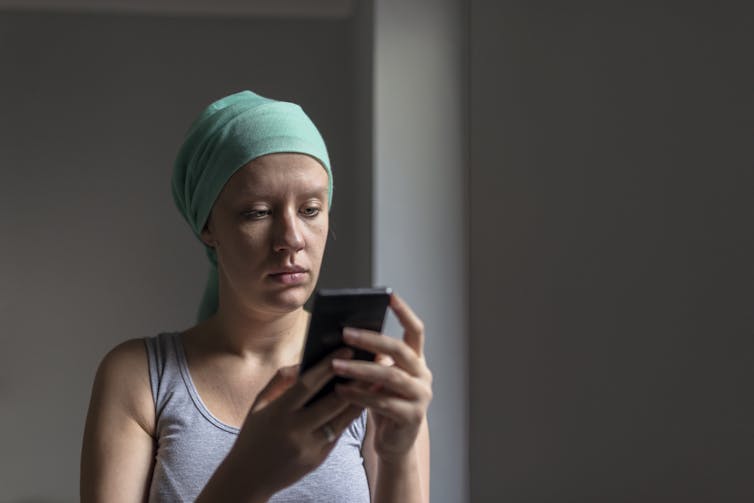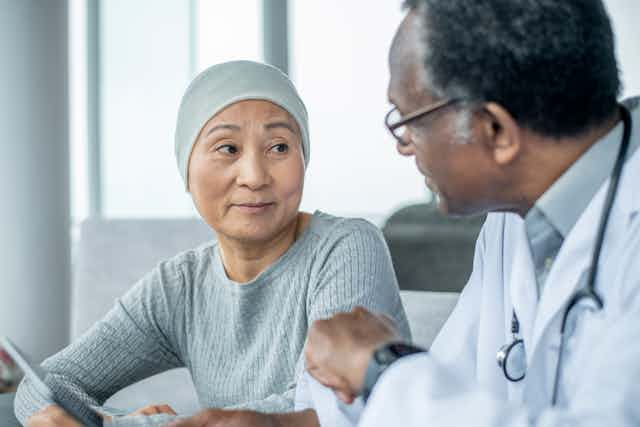Cancer is no longer spoken of only in a whisper. Today, the disease – although still dreaded, still terrifying – is routinely and openly discussed in all media.
Yet in more intimate settings – as when patients privately discuss a cancer diagnosis or treatment with doctors, partners, family and friends – most patients are quiet and passive when raising their concerns and expressing their feelings.
I am a professor in the School of Communication at San Diego State University and director of the Center for Communication, Health & the Public Good. For more than 30 years I’ve studied cancer communication between patients and those close to them.
Until now, little was known about these interactions, even though tens of millions of Americans – nearly 40% – will receive a cancer diagnosis sometime during their lifetime. My analysis reveals new and often surprising insights into how people communicate when navigating their way through cancer. Some of these insights could be used to improve patient coping and care.

The family phone calls
I began to study these interactions in 1988, when a family donated to me 61 recorded telephone conversations taking place over 13 months.
The recordings are the first natural history of one family’s 13-month cancer journey, from diagnosis to death of a loved one. These are conversations primarily between the patient, her spouse and her son.
This is an excerpt from the mother talking with the son for the first time since her diagnosis. She had just told him the diagnosis was “real bad.”
Mom: I might be real lucky in five years. It might be just six months.
Son: Yeah.
Mom: Who knows.
Son: Phew.
Mom: Yeah.
During emotional moments like this, speakers may not know what to say, or how to say it. Very few words are spoken. And despite the stereotype that conversations about cancer are extremely emotional, family members typically are stoic.
Avoiding strong emotions can help patients and family members better ask and respond to questions about key information: What did the doctor say about mom’s condition? Are the test results back? If so, what do they mean? These types of discussions become the family’s “new normal.”
My research shows that families dealing with cancer often live in a chronic state of flux; they do not know how the future will unfold. At the same time, they invest considerable efforts in hoping for the best and maintaining a “state of readiness” for dealing with unexpected troubles and emergencies.

The video recordings
My team and I also studied nearly 200 video recordings of interviews between patients and their oncologists at a comprehensive cancer clinic. The interviews were filmed over a two-year period.
We soon discovered that meeting with a medical team is very different from the phone conversations between families.
In a clinical setting, time constraints are necessary. Conversations with doctors can confuse and intimidate, especially when medical jargon is used to explain complex details about cancer. Patients tend to subordinate themselves to medical authority by remaining quiet and asking few questions.
There are moments, however, when patients actively resist, challenge or express disappointment with a doctor’s statements:
Doctor: Everything looks fine. Nothing’s changed.
Patient: It’s not changed? That means it’s not getting any better? … So that means I’m gonna have to keep on with this treatment? … And to find that I’m just stable is a bit of a disappointment.
A recent study reveals that doctors treat “stable cancer” as good news; the majority of patients do not.

Discussing fear, hope and pain
When meeting with doctors, patients sometimes withhold important information about their illness. They often raise concerns indirectly. Doctors may find it difficult to discern what they are alluding to or hinting about; a patient’s needs may not be fully acknowledged, much less actually addressed.
For example, when patients raise fears about the cancer, the majority of doctors may briefly acknowledge their distress – but they are minimally receptive to their concerns. When patients search for hope and positive news, doctors provide brief responses and even shift topics away from such inquiries. When patients discuss their pain, only on rare occasions do doctors ask them to elaborate or display personal concern for their discomfort.
In those cases in which doctors do provide immediate and detailed responses to a patient’s questions, an irony arises: These answers often increase a patient’s anxieties and uncertainties. Usually that’s because they can’t understand the doctor’s technical descriptions – or because they haven’t yet accepted the fact that much about cancer is still unknown.
Still, most encounters are not dark and foreboding. When doctors invest the time to invite patients to elaborate on their concerns, and respond with empathy and compassion, a partnership is created. Problems are confronted; healing is pursued together. Patients feel heard, understood and respected.
[Over 100,000 readers rely on The Conversation’s newsletter to understand the world. Sign up today.]
Observations from these phone and video recordings just scratch the surface of what can be learned. More research may help develop approaches that provide reassurance to patients and counter the relentless fears they face. But already there are some things we know: A cancer diagnosis is more about life and hope than death and despair. And compassionate communication is essential for patients trying to accept their condition and heal their illness.

